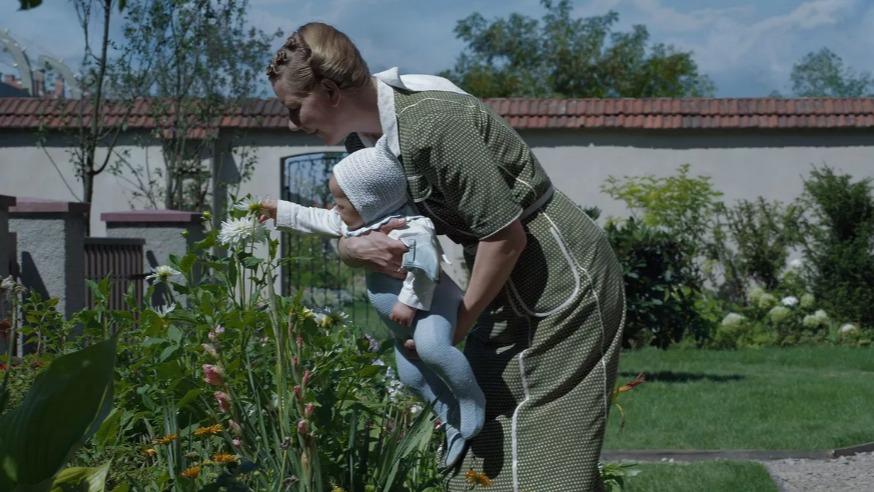Nicolas Giuliani is a director. He notably created a collection dedicated to documentary cinema.
To discover
PODCAST - Listen to the club Le Club Le Figaro Idées with Eugénie Bastié
In these columns,
The Zone of Interest
by Jonathan Glazer aroused the indignation of François Margolin who raged against
the aesthetics
of the film then dared to hypothesize that its success in theaters would be linked to our latent anti-Semitism.
Based on one of the cornerstones of French criticism, he considers that the beauty of the film is shocking.
And asserts that
“a trip to an Auschwitz barracks is always immoral, even if we only see a good third of it.”
We should be pleased that François Margolin uses arguments specific to the form of the film to support his arguments, but unfortunately he uses them for bad purposes.
From the end of the 1950s, following André Bazin, the question of “morality” ran through French criticism.
From Jacques Rivette to Luc Moullet via Eric Rohmer or Jean-Luc Godard, everyone considers that cinema has a “moral” vocation.
Today, it could almost make you smile as the word has a bad reputation, especially when it comes to talking about art.
Yet these young critics were right.
And we are wrong to repudiate this word.
Because by placing themselves in the lineage of the great moralist authors whom they admired, they were saying something fundamental, which must be repeated, and never forgotten.
Formal choices are ethical.
They affect meaning.
From this perspective, they continued a critical heritage which descends directly from the
Salons
of Jacques Diderot then the art critics of Charles Baudelaire.
We don't ask critics to give good points with formulas stitched with superlatives and flashy adjectives.
Criticism is asked to constantly redefine the territory of aesthetics, in order to help us discern the meaning of images, better understand what we see, update our understanding of beauty, and sometimes warn us to which is misleading, fallacious, and possibly "immoral."
Here the chilling aesthetic plays against the characters.
Nicolas Giuliani
As François Margolin suggests, it was animated by this faith in criticism that Jacques Rivette assassinated Gillo Pontecorvo's
Kapo
in a famous article from June 1961, entitled
"Abjection."
What did he reject from this first fiction dealing with Nazi concentration camps?
Not that the filmmaker used the tracking shot.
Because otherwise, why would Jacques Rivette have so admired
Night and Fog
by Alain Resnais (1956), which is full of them?
What the young critic rejects is not so much the tracking shot as its use.
“See, however, in
Kapo
, the shot where Riva commits suicide, by throwing herself onto the electrified barbed wire;
the man who decides, at this moment, to do a tracking shot to reframe the corpse from a low angle, taking care to register the raised hand exactly in one corner of his final framing, this man only has the right 'with the deepest contempt.
»
Then to continue, affirming that what matters is
“the attitude
[of the filmmaker]
in relation to what he films (…) in relation to the world and to all things.”
This ethical conception of cinema has nothing to do with a moralizing conception of existence.
This does not mean that an author must prohibit a subject according to criteria relating to good or evil, but that he has the ethical and formal responsibility for what he shows.
We can talk about anything, but there is a way to do it.
This requirement is found in all the great filmmakers of modernity, from Roberto Rossellini to Pier Paolo Pasolini, from Abbas Kiarostami to Wang Bing.
Following this teaching, we see clearly that what is at stake is not so much to censor the figure of the tracking shot, but to observe the gaze of the filmmaker behind it.
We should then return to the accusation according to which Jonathan Glazer has
aestheticized
reality, as if he had sought to beautify the executioners he films.
Because it is of course quite the opposite that runs through this great film.
Here the chilling aesthetic plays against the characters.
What do we actually see?
Wide shots that observe the Höss family in an almost entomologist-like manner, without ever getting close to their faces.
Lateral tracking shots filmed flat, blocked, without perspective.
A maniacal obsession with connection-movement (see the way Höss closes each door, turns off each lamp).
A circulation in space as in a labyrinth closed on itself.
The rigor of a staging which fundamentally rejects any spectacle, which is precisely what made Claude Lanzmann hate
Schindler's List
.
The insulting innocence of a garden, when paradise itself becomes a blasphemy spat in the face of life and creation.
Besides, is this great film devoid of affect, and saturated by a terrible soundtrack, even beautiful?
Because if it was, it would seem that it was according to the aesthetic canons of National Socialism.
We cannot speak for the 500,000 spectators who saw
The Zone of Interest
, and who according to the author are all “bobos”.
But looking at the film we have seen, we can say with conviction that no sort of immorality is lodged in the form of the film.
Rather than projecting what we think we see, we must return to what is shown to us.
And to be pleased that a great film manages to probe the cold action of evil.

